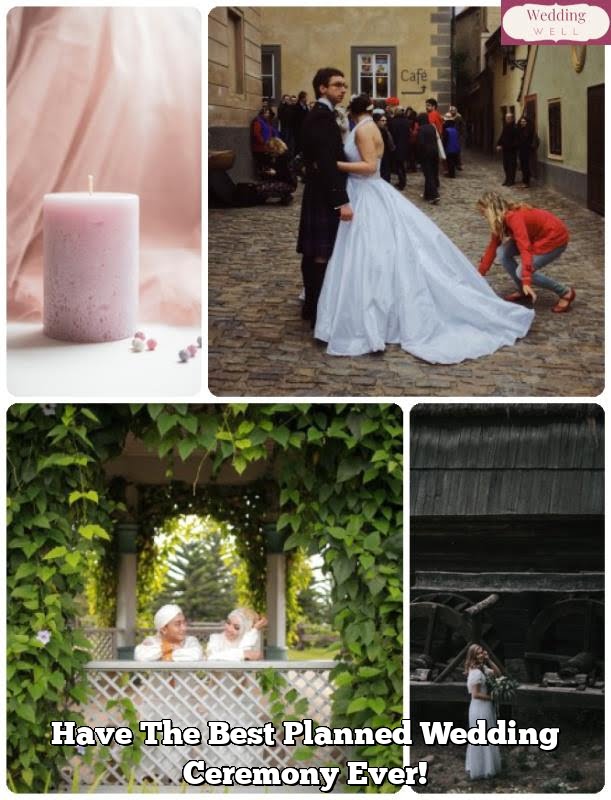Are you wondering how to write a wedding ceremony that captures the essence of your love and commitment? Crafting a meaningful and personalized wedding ceremony script is an essential part of planning your special day.
From understanding the structure of a wedding ceremony to choosing the right words for vows and readings, there are several important elements to consider. In this article, we will guide you through the process of writing a wedding ceremony that reflects your relationship and sets the tone for a beautiful celebration of love.
When it comes to writing a wedding ceremony, many couples may feel overwhelmed or unsure where to begin. With the help of this comprehensive guide, you will gain valuable insights into the process of creating a memorable and heartfelt ceremony script. Understanding the structure of a wedding ceremony, incorporating personal touches and traditions, as well as collaborating with officiants and wedding planners are just some of the topics we will explore.
Crafting a wedding ceremony script is an opportunity for you to express your love in your own unique way. Whether you choose to infuse humor, sentimentality, or cultural traditions into your vows and readings, this article will provide practical tips on how to write with emotion and meaning. By the end of this guide, you will be equipped with the knowledge and confidence to orchestrate a beautiful wedding ceremony that perfectly reflects your love story.
Understanding the Structure of a Wedding Ceremony
Elements of a Traditional Wedding Ceremony
When it comes to writing a wedding ceremony, it’s important to understand the traditional elements that make up the structure. These elements typically include the processional, opening words, readings or religious rituals, vows, ring exchange, pronouncement of marriage, and the recessional. Understanding how these components fit together can help you plan out the flow of your ceremony and ensure that all important moments are included.
Cultural and Religious Considerations
It’s essential to consider any cultural or religious traditions that may need to be incorporated into your wedding ceremony. Whether you’re planning a traditional Christian wedding, a Jewish ceremony, an interfaith celebration, or a secular gathering, understanding the structure and requirements of these different ceremonies is crucial for creating a meaningful and respectful script.
Personalizing the Structure
While there is a traditional structure to follow for most wedding ceremonies, there is also room for personalization. Couples can choose to add unique elements such as special readings, unity rituals (like candle lighting or handfasting), or cultural traditions that hold significance to them. Understanding how to weave these personal touches into the overall structure of the ceremony is essential for creating a meaningful and memorable experience for everyone involved.
Choosing the Right Words
When it comes to choosing the right words for a wedding ceremony, vows and readings play a significant role. These words are what make the ceremony personal, emotional, and memorable. Here are some tips on how to write meaningful vows and select the perfect readings for a wedding ceremony:
Tips for Writing Vows
- Reflect on your relationship: Think about what makes your relationship special and what promises you want to make to each other.
- Be sincere: Write from the heart and use authentic language that truly reflects your feelings.
- Incorporate humor or personal anecdotes: If appropriate, adding a touch of humor or sharing a personal story can make your vows even more meaningful.
Choosing Readings
- Consider the tone of the ceremony: Whether you want something lighthearted, romantic, or spiritual, choose readings that align with the overall tone of the ceremony.
- Consult with your officiant: Your officiant can help guide you in selecting readings that resonate with both of you and convey the message you want to share.
- Personalize the selections: Look for readings from literature, poetry, or even song lyrics that hold special meaning for both of you as a couple.
By taking these tips into account when selecting and writing vows and readings, you can create a wedding ceremony that is uniquely yours and truly captures the essence of your love story. The right words have the power to touch hearts and create cherished memories for years to come.
Incorporating Personal Touches and Traditions
When writing a wedding ceremony, it is essential to consider the personal touches and traditions that will make the event unique and meaningful for the couple. Incorporating cultural traditions, family rituals, or personal anecdotes can add depth and significance to the ceremony. Here are some ideas for incorporating personal touches and traditions into your wedding ceremony script:
- Include a unity ritual: Whether it’s a candle lighting ceremony, handfasting ritual, or sand pouring ritual, incorporating a unity ritual can symbolize the joining of two individuals and their families.
- Add personal vows: Encourage the couple to write their own vows to express their love and commitment in their own words. This allows them to infuse the ceremony with their unique personalities and promises to each other.
- Honor cultural traditions: If the couple comes from different cultural backgrounds, consider including elements from each culture into the ceremony. This can include traditional dances, rituals, or blessings that hold special meaning for the couple and their families.
It’s important to work closely with the couple to understand which personal touches and traditions are meaningful to them. By doing so, you can create a wedding ceremony script that truly reflects who they are as individuals and as a couple.
In addition to incorporating personal touches and traditions, it’s also important to ensure that these elements flow seamlessly within the structure of the ceremony. By striking a balance between tradition and personalization, you can create a wedding ceremony that is both heartfelt and memorable for everyone involved.
Setting the Tone
When writing a wedding ceremony, it is crucial to set the tone with emotion and meaning. The ceremony should reflect the love and commitment of the couple getting married, as well as convey the significance of this special occasion. One way to infuse emotion into the script is by incorporating personal stories and anecdotes that are meaningful to the couple.
In addition to personal touches, selecting the right words and language can also contribute to setting the tone of the ceremony. The vows and readings chosen should resonate with both the couple and their guests, evoking feelings of joy, love, and unity. It is important to carefully consider the language used in these components of the ceremony, as they have the power to capture the essence of the couple’s relationship.
Furthermore, writing with emotion and meaning involves creating a sense of intimacy and connection between the couple and their audience. This can be achieved through heartfelt expressions of love and gratitude, as well as by sharing insights into what makes their relationship unique. By doing so, the wedding ceremony becomes not only a celebration of love but also a reflection of the couple’s journey together.
| Aspect | Importance |
|---|---|
| Personal Touches | Infuse emotion into script |
| Vows Readings | Resonate with couple & guests |
| Language used | Capture essence of relationship |
Crafting a Memorable Opening and Closing
Setting the Tone
The opening and closing of a wedding ceremony are crucial moments that set the tone for the entire event. When crafting these parts of the script, it’s important to consider the overall atmosphere you want to create.
Whether it’s lighthearted and joyful or solemn and traditional, the language used in the opening and closing should reflect the mood you wish to convey. Consider using personal anecdotes, quotes, or even a bit of humor to engage your guests and create a memorable beginning and end to the ceremony.
Expressing Gratitude
In both the opening and closing sections of your wedding ceremony script, it’s essential to express gratitude. The opening is an ideal time to thank all those present for joining in celebration, while also acknowledging loved ones who may not be able to attend.
The closing provides an opportunity to thank guests once more for their presence, support, and love. It’s also a moment to extend thanks to anyone else who has contributed to making the day possible, such as vendors, planners, and officiants.
Weaving in Symbolism
Another way to craft a memorable opening and closing is by weaving in meaningful symbolism. This could include incorporating rituals such as unity ceremonies or cultural traditions that hold significance for you as a couple. Creating visual imagery through words can evoke powerful emotions in both your guests and yourselves. Whether it’s through nature-inspired metaphors or personal symbols that hold sentimental value, using symbolic language can add depth and meaning to your wedding ceremony script.
Tips for Collaborating With Officiants and Wedding Planners
When it comes to collaborating with officiants and wedding planners, communication is key. It’s important to have open and clear lines of communication with all parties involved in the wedding ceremony. This means discussing your vision for the ceremony, any specific traditions or personal touches you want to incorporate, and any special requirements or restrictions.
Start by scheduling a meeting with the officiant and wedding planner to go over the details of the ceremony. Discuss the structure of the ceremony, including any cultural or religious elements that are important to you. It’s also essential to communicate your preferences for the tone and atmosphere of the ceremony, as well as any specific readings or vows you’d like to include.
Collaborating with officiants and wedding planners also means being open to their input and expertise. They may have valuable insights and suggestions based on their experience with previous ceremonies. Be willing to listen to their ideas while also staying true to your vision for the day.
Remember that working together as a team will result in a beautifully coordinated and meaningful ceremony that reflects both your love story and your values as a couple. By maintaining open communication, being receptive to feedback, and staying organized throughout the process, you can ensure that your wedding ceremony is everything you’ve dreamed of and more-all through effective collaboration.
By following these tips for collaborating with officiants and wedding planners, you can ensure that your wedding ceremony script captures the essence of your love story while incorporating meaningful traditions and personal touches. Whether it’s through thoughtful discussions about structure and tone or by remaining open to suggestions from experienced professionals, effective collaboration will result in a truly memorable celebration of love.
Rehearsing and Fine-Tuning the Ceremony Script
Once you have written the wedding ceremony script, the next step is to rehearse and fine-tune it to ensure that everything flows smoothly on the big day. Rehearsing the ceremony allows everyone involved to understand their roles, timing, and any specific cues they need to be aware of.
When fine-tuning the ceremony script, it’s important to consider the overall flow of the event. This includes making sure that transitions between different parts of the ceremony are seamless and that there are no awkward pauses or abrupt changes in tone. It’s also a good time to review any specific instructions for readings, music cues, or symbolic rituals that are being incorporated into the ceremony.
Collaborating with your officiant, wedding planner, and any other key individuals involved in the ceremony is crucial during this phase. They can provide valuable feedback on how the script reads aloud and offer suggestions for improvement. Keep in mind that this is also an opportunity to make any necessary adjustments based on logistical considerations (such as space constraints) or changes in the order of events.
| Key Considerations for Rehearsing and Fine-Tuning | Additional Tips |
|---|---|
| Ensure smooth transitions between different parts of the ceremony | Assign someone to coordinate cues and timing during the rehearsal |
| Review specific instructions for readings, music cues, or symbolic rituals | Consider recording a video of the rehearsal for reference |
| Solicit feedback from officiant, wedding planner, and other key individuals | Prepare a contingency plan for unexpected situations during the ceremony |
Finalizing the Wedding Ceremony Script
As you approach the final stages of writing your wedding ceremony script, it’s important to consider the dos and don’ts to ensure that the final result is a beautiful and meaningful representation of your love for one another. Here are some important factors to keep in mind as you finalize your wedding ceremony script.
One of the most important “dos” when finalizing your wedding ceremony script is to ensure that it accurately reflects your values, beliefs, and personalities as a couple. This is your opportunity to express what marriage means to you and what you hope to achieve together. Take the time to review the script and make sure that every word resonates with both of you.
On the other hand, there are also some “don’ts” to keep in mind. One common mistake couples make when finalizing their wedding ceremony script is trying to please everyone else. Remember that this day is about you and your partner, so don’t feel pressured to include elements that don’t hold personal significance for you both. Additionally, avoid using overly clichéd language or sentiments that feel insincere.
Another important “do” when finalizing your wedding ceremony script is to make sure that it flows well from beginning to end. Consider the overall tone of the ceremony and ensure that there is a natural progression from one section to the next. This will help create a cohesive and memorable experience for both you and your guests.
Overall, finalizing your wedding ceremony script should be a collaborative effort between you, your partner, any officiants involved, and potentially even a wedding planner or coordinator. By keeping these dos and don’ts in mind, you can ensure that your final script truly captures the essence of your love and commitment to one another.
By following these steps in this section on Finalizing the Wedding Ceremony Script: Dos and Don’ts within our article on How to Write a Wedding Ceremony you can write an incredibly memorable event for those who attend.
Conclusion
In conclusion, writing a wedding ceremony is a unique opportunity to celebrate love through the written word. By understanding the structure of a wedding ceremony and choosing the right words for vows and readings, couples can create a truly meaningful and personalized experience for themselves and their loved ones. Incorporating personal touches and traditions, setting the tone with emotion and meaning, and crafting a memorable opening and closing are all essential elements in composing a beautiful ceremony.
Collaborating with officiants and wedding planners can also provide valuable insight and guidance in ensuring that the script flows smoothly and resonates with both the couple and their guests. Additionally, rehearsing and fine-tuning the ceremony script is crucial in making sure that the words are delivered with sincerity and authenticity on the big day.
Finally, as couples finalize their wedding ceremony script, they should keep in mind the dos and don’ts of creating a meaningful, respectful, and inclusive experience for everyone involved.
Ultimately, writing a wedding ceremony is a deeply personal and impactful process that reflects the love shared between two individuals. It allows couples to express their commitment to each other in front of their loved ones in an authentic way that will be remembered for years to come. By following these guidelines on how to write a wedding ceremony, couples can create a truly special moment that embodies their unique love story.
Frequently Asked Questions
How Do I Write My Wedding Ceremony?
Writing your wedding ceremony involves creating a meaningful and personalized script that reflects your love story and values as a couple. It should include elements like vows, ring exchange, readings, and any cultural or religious rituals you want to incorporate.
How Do You Format a Wedding Ceremony?
Formatting a wedding ceremony typically involves structuring it in a way that flows seamlessly from one part to the next. This can involve deciding on the order of events, transitions between different segments, and ensuring that the tone matches the overall theme or vibe of the wedding.
How Do You Write a Wedding Ceremony Program?
When writing a wedding ceremony program, it’s important to include key details such as the names of the bride and groom, date, time, and location of the ceremony. You can also outline the sequence of events so that guests know what to expect and when to participate. Additionally, consider including any special acknowledgments or dedications in the program.

Welcome to my blog about home and family. This blog is a place where I will share my thoughts, ideas, and experiences related to these important topics. I am a stay-at-home mom with two young children. I hope you enjoy reading it! and may find some helpful tips and ideas that will make your home and family life even better!





